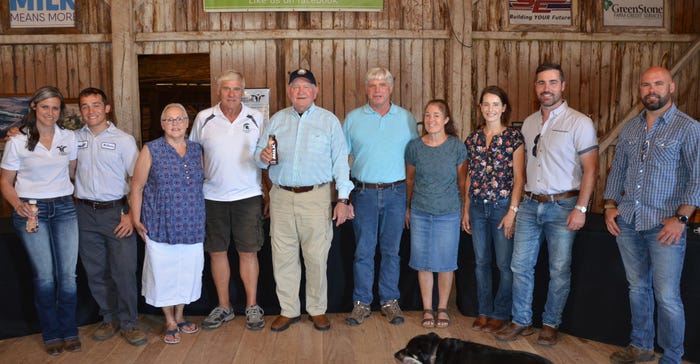
It may be necessary for more direct payments to be made to farmers to help cover losses incurred because of COVID-19, says U.S. Agriculture Secretary Sonny Perdue, who made three stops in Michigan the last day of June.
Under the Coronavirus Food Assistance Program, $16 billion was set aside to help agricultural producers. By late June, Perdue said about $11 million remained available until the Aug. 28 application deadline. While visiting Swisslane Farms, a multigeneration dairy operation in Alto, Perdue said those funds may not be enough.
The payments are available to “various sectors for farmers of all sizes — and kind of regardless of what they grow — they are eligible to apply for indemnification for damage, price destruction or lack of markets during the COVID-19 outbreak,” he said.
Related: Complete coronavirus coverage
Additional funds of up to $14 million may be allocated by Congress, Perdue said, using disaster programs through the Commodity Credit Corporation, which is a government-owned and operated entity created to stabilize, support and protect farm income and prices.
In addition to this direct support to farmers and ranchers, USDA’s Farmers to Families Food Box Program also may need an extension or expansion.
The program established a partnership with regional and local distributors — whose workforces have been significantly affected by the closure of many restaurants, hotels and other food service entities — to purchase $3 billion in fresh produce, dairy and meat, and deliver boxes to Americans in need.
“It really depends; there may be enough money to go through the end of the year,” Perdue said, while noting that 25 million boxes already had been distributed. “We know COVID had some immediate impacts on agriculture; we fear it may have a longer tail going into the fall, as well.”
Besides visiting Swisslane Farms, Perdue also visited Impact Church in Detroit and Van Eerden Foodservice in Grand Rapids, where he assisted with the food box program.
USMCA update
Perdue also touched on the implementation of the United States-Mexico-Canada Agreement, which was to go into effect the following day, July 1. He said USMCA eliminates Canada’s unfair Class 7 milk pricing scheme that was developed to allow low-priced Canadian dairy products to undersell U.S. products in Canada and in third-country markets. It also will expand U.S. access to Canada’s poultry and egg markets.
“The U.S. is prepared to hold Canada and Mexico to the agreement that’s written,” Perdue said.
Another hot topic was labor. “Sustainable labor is very important,” he said. “Many people don’t want to do these kinds of jobs. Try to find someone in Grand Rapids that wants to come milk cows, or pick up hay or drive a tractor. We will continue to work on it with the Department of Labor and Homeland Security to get a legal, viable, sustainable workforce.
“Trade and labor are the two biggest questions we get no matter what kind of farm. We are making some progress with farm labor and homeland security, but it’s been a huge battle on that.”
Regulations continue to be a concern, and Perdue said, “I encourage all farmers when they see proposed regulations from USDA, FDA, EPA, energy and all those kind of agencies that affect your business, please be aggressive in telling regulators how that will impact your business.”
For more information on farmer payments, visit farmers.gov/cfap.
Read more about:
Covid 19About the Author(s)
You May Also Like






